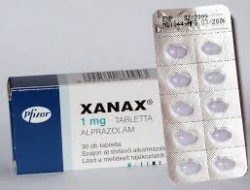Xanax Addiction
The Watershed Addiction Treatment Programs
The Watershed of the Palm Beaches is licensed by the State of Florida and “Gold Seal” accredited by The Joint Commission for alcohol and drug treatment. This symbolizes value and illumines the dedication to meeting industry performance standards. We are a world-class health care facility that offers professional addiction treatment. Just two miles from beautiful Palm Beach County beaches, our rehabilitation center is the perfect setting to emerge refreshed and renewed.
Read More ›Xanax is a brand name for the medication alprazolam. It is prescribed for the treatment of anxiety disorders and panic disorders, and is in a class of drugs called benzodiazepines. Xanax has a high risk for abuse. Abuse of the drug can lead to Xanax addiction, which entails a loss of control over your use of the drug.
The withdrawal syndrome associated with alprazolam is a cause of worry, as well, as it can be fatal. It is important to seek medical help when detoxing from Xanax and addiction treatment can help you overcome your addiction to the drug.
How Xanax is Abused and What the Effects Are

Xanax is prescribed for anxiety disorders, although the medication has a high potential for abuse.
Xanax comes as a tablet, an extended release tablet, an orally disintegrating tablet, and a liquid solution. When you take more than prescribed, in a way other than as prescribed, or take it without a prescription you are considered to be engaging in Xanax abuse. For recreational purposes people have been known to crush up the tablets and snort them, as well.
The effects of Xanax are meant to be relaxing and somewhat sedating. People report feeling calm, relaxed, and happy while on Xanax.
Xanax Side Effects
Alprazolam, like most medications, does have a number of potential side effects. If you are taking the drug in a way other than as prescribed, these side effects may be more amplified or more likely to occur.
According to the US National Library of Medicine, some of the side effects of Xanax include:
- Drowsiness
- Lightheadedness
- Headache
- Tiredness, dizziness
- Irritability
- Talkativeness
- Difficulty concentrating
- Dry mouth
- Increased salivation
- Changes in sex drive or ability
- Nausea
- Constipation
- Changes in appetite
- Weight changes
- Difficulty urinating
- Joint pain
Some side effects of alprazolam are very serious, and if you experience any of them you must call your doctor immediately. These may include:
- Shortness of breath
- Seizures
- Hallucinating
- Severe skin rash
- Yellowing of the eyes or skin
- Depression
- Memory problems, confusion
- Problems with speech
- Unusual changes in mood or behavior
- Thinking about harming or killing yourself
- Problems with coordination or balance
Xanax Overdose
It is possible to overdose on Xanax, as well. Xanax overdose can cause serious health problems, coma, and death. If you or someone you are with is experiencing any of these symptoms after taking Xanax, call poison control right away, and if they collapse or are not breathing call 911.
Symptoms of Xanax overdose:
- Drowsiness
- Confusion
- Problems with coordination
- Loss of consciousness
Xanax Withdrawal
Xanax withdrawal is the collection of negative symptoms that occur when someone who is dependent on the drug abruptly stops taking it. According to the Journal of Substance Abuse Treatment, alprazolam withdrawal occurs rapidly and intensely due to the drug’s short half-life. Experiencing withdrawal from Xanax is a sign that you are dependent on the drug, and can be a sign of addiction.
Alprazolam withdrawal is dangerous, and in severe cases seizures, hallucinations, and fever can occur. Out of all withdrawal syndromes, that from benzodiazepines is one of the most dangerous. For this reason, it is essential that you seek help from your doctor or an addiction treatment center when you decide to stop using Xanax. They may suggest a tapering plan, where you slowly and steadily reduce your dosage in order to avoid shocking your body in any way.
According to the Connecticut Prescription Monitoring Program, these are some of the withdrawal symptoms you can expect:
- Insomnia
- Headaches
- Nausea, vomiting
- Lightheadedness
- Sweating
- Anxiety
- Fatigue
- Uncontrollable shaking in part of your body
- Blurred vision
- Sensitivity to light or sound
- Change in sense of smell
- Difficulty concentrating
- Aggressive behavior
- Irritability
- Twitching or cramps
Signs of Xanax Addiction
To have developed a Xanax addiction means that you no longer have control over your drug use. It involves compulsive drug-seeking behavior, taking Xanax despite knowing the consequences of doing so, and feeling withdrawal symptoms when you do not have the drug.
Xanax addiction can lead to significant problems in your life, including relationship issues, problems in work or at school, health problems, financial issues, problems with the law and more. The sooner you get help for Xanax dependence or addiction, the better your chances are at lessening these issues.
These are potential Xanax addiction symptoms:
- ‘Doctor shopping’ or going to several doctors in an attempt to get more of the medication
- Finishing prescriptions early
- Trying to stop using Xanax but being unsuccessful
- Taking the drug despite experiencing problems because of it
- Unexplained financial loss, constantly needing money
- Sudden change in friends, hangouts
- Loss of interest in previously enjoyed activities
- Unexplained weight loss or gain
- Insomnia or lethargy
- Lack of attention to physical appearance, personal hygiene
- Irritability, seeming anxious or withdrawn, acting ‘shady’
- Compulsive drug seeking behavior
If you or someone you love is displaying any of these signs, find help now.
Getting Treatment for Xanax Addiction
Xanax addiction recovery is possible, and the safest way to achieve recovery is to get the help of a treatment and/or medical professional. Given the nature of and dangers associated with Xanax withdrawal, it is especially essential to seek help during detox.
According to the Journal of Addiction, treating Xanax dependence should involve a tapering period, where the patient slowly takes smaller doses of the medication before finally not taking any at all. This may take weeks or months, depending on the person. Psychological support should be made available as well, especially for individuals who have been taking alprazolam for legitimate purposes.
In the context of addiction, however, treatment will also include counseling and therapy. Counseling is used to help people recognize any underlying reasons why they use drugs and to overcome or work through these things in their lives. It can also help people to recognize patterns in belief, thought, and behavior that lead to drug use so that they can be changed and prevent drug use. Counseling in addiction treatment can also help build a person’s motivation for change, and willingness to work on this while in treatment.
Treatment Settings
Xanax addiction treatment may take place in a few different settings. Unless you have been mandated into treatment by the court system, which setting you go to will be your choice. When making this decision, you will want to consider factors such as cost, location, whether or not you suffer from any co-existing medical or mental health conditions, and what your family life and support system are like.
The main treatment settings for alprazolam addiction are:
- Inpatient or residential treatment facilities
- Outpatient rehab centers
- Sober living homes
- Support groups
If you or someone you love is struggling with an addiction to Xanax it is important that you seek help now.



